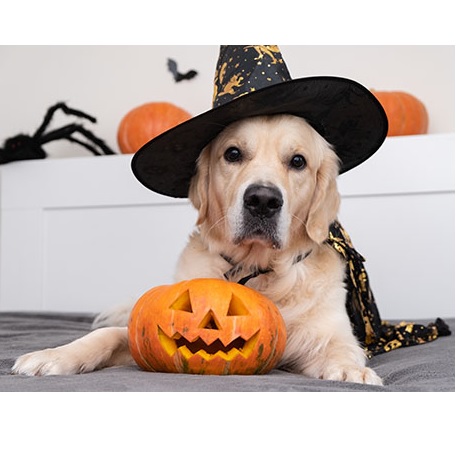Tips From a K-State Veterinarian to Keep Your Pets Safe and Less Stressed This Halloween

Halloween is a day where some delight in getting a fright, but don't let the holiday's potential safety hazards sneak up on your pets.
Susan Nelson, clinical professor at the Veterinary Health Center in the College of Veterinary Medicine, has some tips to help keep pets safe.
Nelson suggests leaving pets indoors before, during and a few days after the holiday for their safety.
"Cats, especially black ones, are often sought after with cruel intentions during Halloween," Nelson said.
While trick-or-treaters are knocking at the door, Nelson advises keeping pets in a back room with the TV turned on to help block the noise caused by doorbells and children.
"Be conscious of open doors, as some animals might make attempts to go outside," Nelson said. "Make sure pets have some form of identification, such as microchips, collars or tags. Reflective collars will make it safer should the pets get out, as it will make them more visible."
Nelson suggests putting pet costumes on before Halloween to make sure the pet can see, hear, breathe and move.
"When shopping for pet Halloween costumes, be mindful of costumes that have loose or small parts that could be pulled off and ingested," Nelson said. "If your pet seems distressed or allergic or shows abnormal behavior with a costume, consider having it wear a Halloween-themed bandana instead or nothing at all if even that causes distress."
For pets that have a love for candy or decorations, Nelson has some tricks to keep them safe:
- Keep all candy out of reach to avoid accidental ingestion of ingredients that can be toxic to pets or injure/obstruct their GI tracts. Examples of toxins are chocolate, Xylitol — an artificial sweetener — raisins and some types of nuts.
- Consider disconnecting your doorbell or greeting trick-or-treaters at the end of your driveway, weather permitting, if the sound of the bell upsets your pet.
- Be mindful that pets may be frightened by one of their familiar family members when that person is disguised in a costume. Acclimate them to the sight ahead of time.
- Keep your pet away from electrical cords, candles and decorations to avoid accidental ingestion.
- Throw away moldy pumpkins — they can cause illness if ingested.
- Store glow sticks out of reach; they taste bitter and can cause drooling and agitation if ingested.
If you suspect your pet has ingested something toxic, immediately call your veterinarian, the ASPCA Poison Control Center at 888-426-4435 or the Pet Poison Helpline at 855-764-7661 for advice.
For more information, contact the Kansas State University Veterinary Health Center at (785) 532-5690.
